by Robert Lynch; October 11, 2024
Tompkins County’s annual budgeting process always begs for the exclamation, “Cut to the chase!” And if you feel like shouting those words, just be glad you’re not on the Tompkins County Legislature.
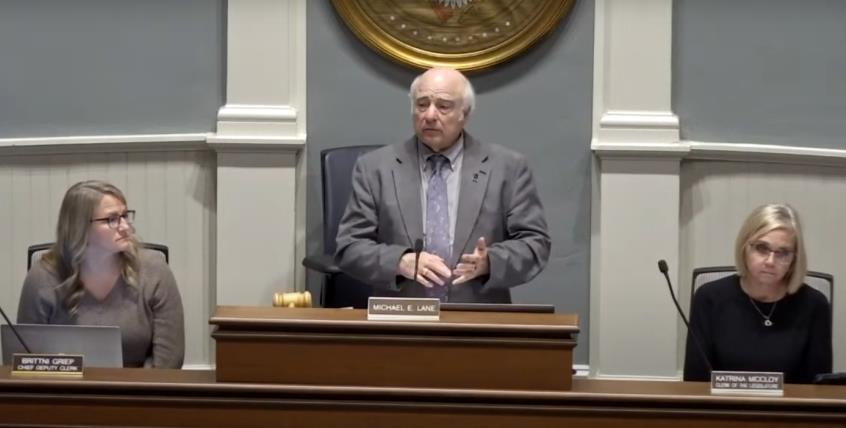
During three exhausting, mind-numbing, eye-glazing marathon sessions within the past week, our county’s 14 legislators massaged, subtracted from—but mostly added to—County Administrator Lisa Holmes’ recommended $252 Million 2025 County Budget.
Tompkins County budgeting is never an easy exercise. Too many departments and agencies want to hang added ornaments onto an already-overloaded financial Christmas tree. Too many legislators simply want to talk. Combined, the three meetings ran a total of nearly 12 hours.
Now, eleven days into this October, the legislative committee-of-the-whole that engineers the budget process has handed forth a proposal that would raise just over $55 Million through property taxes. It would hike the tax levy by 3.29 per cent from that of the current year. For those fortunate enough to own a $300,000 home—the median value in Tompkins County, we’re told—the budget would add $123.66 to your County tax bill, raising it to $1,446.
“Essentially we’re hitting the people with a 9.3 per cent increase in their property tax bill if we pass this,” Groton Republican Lee Shurtleff pointed out shortly before he voted against the budget this past Tuesday. Shurtleff compared median homeowner assessments this year to last. Home assessments have inflated much faster than have those for other properties.
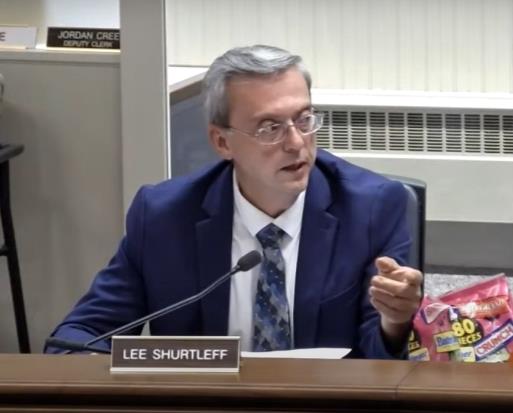
Tuesday’s committee vote on the recommended budget was 7-6. (Legislator Travis Brooks was excused that day.) Each of the Legislature’s three Republicans opposed the recommendation, along with Democrats Greg Mezey and Rich John. At the last minute, Legislature Chair Dan Klein, another Democrat, switched his vote and joined the opposition.
What emerged from the meeting is a mere recommendation, odd as that is since all legislators participate in the so-called Expanded Budget Committee. Its recommendation requires ratification at a regular Legislature meeting to become an official “tentative budget” and to earn the right to a Public Hearing near Halloween. The Legislature next meets Tuesday, the 15th.
Before taking their final vote, the committee debated for almost an hour, and then defeated legislator Greg Mezey’s last-minute amendment. Mezey would have drawn nearly $1.5 Million from Tompkins County’s massive fund balance, applied $409,715 of it to back “one-time funding” for add-on appropriations, and used its just over $1 Million remainder to decrease the tax levy by two per cent from that otherwise imposed. Mezey’s motion lost five votes to eight.
Of those representing Enfield, Democrat Anne Koreman opposed the amendment, yet supported the budget. Republican Randy Brown did just the opposite.
The drive-by reader may question how the proposed tax increases now under discussion got so small. There’s a reason.
When she first presented her recommended budget to the Legislature September third, Administrator Holmes had proposed a 4.34 per cent levy increase, just below the state’s specified—and largely symbolic—4.5 per cent “tax cap,” as that cap’s computed this year for Tompkins County. What’s changed since then is a pair of under-reported corrections and adjustments that Holmes briefly outlined to the Legislature October first. The County Communications Department’s initial reports on committee deliberations failed to acknowledge either.
“This is kind of a ‘could’a, would’a, should’a,” Holmes described to the Legislature October first as she revealed that budget planners had suddenly found an extra $950,000 to play with.
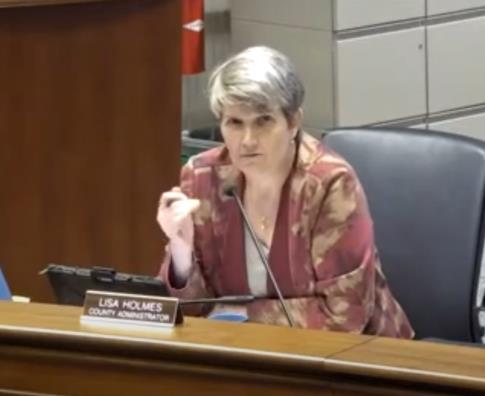
First, there’s a “market adjustment” affecting salary reimbursements, Holmes said. “The amount we receive from New York State for eligible reimbursement… we did come under budget for what we projected by about $450,000,” the Administrator explained.
Holmes said the administration and finance staff had also “detected a discrepancy in the debt service schedule” for a “Green Facilities” project. Essentially, somebody accidentally had counted some obligations twice. “We caught it before it happened,” Holmes explained.
“It’s kind of nice to have an October Surprise that’s good news from our own administrative staff and Finance,” Budget Committee Chair Mike Lane reacted that night.
So with newfound money in hand, the trio of arduous, bean-counting committee caucuses began. Holmes’ mini-windfall had cut the projected levy increase to 2.56 per cent. But then, bit-by-bit, stuff—lots of stuff—got added in. The levy increase crept up to 2.63 per cent by the end of meeting one; then jumped to 3.40 per cent by meeting two; then fell back to 3.29 per cent by the final session. All the adjustments become too numerous to mention. Here are a few of them.
Sunflower House is a post-incarceration transitional residence run in part by OAR (now bearing the cumbersome, nondescript name “Opportunities, Alternatives and Resources”). Sunflower House advocates fought hard for continued funding at a Tompkins County Budget Forum September 30th. They’d sought $77,680 from the budget for the home’s operations.
“I think it would be good for us to have this program continue, legislator Veronica Pillar said in Sunflower House’s support October 3rd. “If Sunflower House is closed, then we’re just going to see the same folks (former inmates) in our shelter or on the street and really struggling and being less healthy.”
Pillar proposed budgeting the full $77,680. But then Pillar’s colleague, Travis Brooks, urged amending the appropriation to three-year funding of $45,000. Pillar accepted the change as a friendly amendment. The amended appropriation quickly passed. No one complained at the time. But Sunflower House’s supporters complain now.
“This will have devastating consequences for our most vulnerable populations, especially for those reentering society after incarceration,” Dr. Paula Ioanide, a local professor and reentry services advocate, told The Ithaca Times, as it reported October 10th. “Sunflower Houses is facing a funding shortfall, and without securing additional resources, the program may not be able to continue.”
Security staffing at County facilities got heightened, perhaps controversial attention. By a 7-6 plurality vote (with Mike Sigler excused), the Legislature recommended $227,139 be spent to hire a Security Manager, a full-time security officer, and another officer to work part-time.
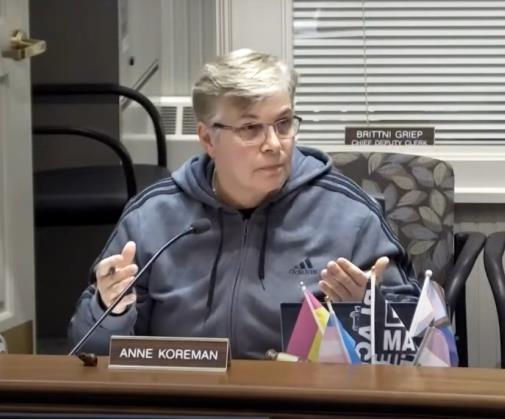
The manager, to be stationed at the Department of Emergency Response in Lansing, would be “monitoring cameras across the county for all locations,” Holmes said. The full-time officer would be stationed primarily at the Mental Health facility on Green Street, the scene of recent problems. But the part-timer, Holmes said, could be deployed “if there needed to be coverage for a Legislature meeting, for instance.” A guard at Legislature meetings would make news.
“Having someone monitor cameras, I don’t understand how that moves us that much closer to being safe,” Travis Brooks said.
Brooks missed the next meeting. But Sigler attended it, and said he may later resurrect the security spending, likely to help scuttle the idea.
Commuter pay for legislators will apparently end in the face of austerity. With six voting support and seven in opposition, the committee rejected Anne Koreman’s motion to continue paying lawmakers when they travel to and from home.
“We don’t get a lot of pay,” Koreman complained, citing her current $22,000 part-time salary. “I don’t have an office. My office is at home.”
Others, including Greg Mezey, worried aloud that legislative commuter pay sets a double-standard.
“We don’t offer reimbursement for any of our staff who may make a little bit more than we do in some situations that are maybe driving from Candor or Spencer or other places,” Mezey countered. “So why we would put ourselves in a different position, I don’t understand.”
“I don’t see the equity in treating ourselves differently from how we treat our regular employees,” Deborah Dawson concurred. “I just don’t think we’re more special animals than everybody else.”
Time for an ounce of levity: “If we built the Center of Government at the mall, it would considerably shorten my commute,” Lansing’s Mike Sigler quipped. A $40 Million new office building was, quite frankly, an argument left for another day. But Sigler, too, opposed commuter compensation.
About 400,000 additional dollars got tucked into the Tompkins County Budget over those three meetings. Mezey’s futile, final Resolution made on that last day of deliberations would have paid for all of the extras from fund balance savings and have drawn nearly $1.07 million additional to give taxpayers what he said was a needed break. It would have cut the tax levy’s increase to 1.29 per cent, lower than inflation.
“Just because inflation is one number doesn’t mean we have to run up and try to catch it,” Mezey argued, as he defended his amendment on that final day. “We are going to over-collect. We are going to underspend. We are going to add additional fund balance. So why, why pass the burden back to the taxpayer when we don’t have to?”
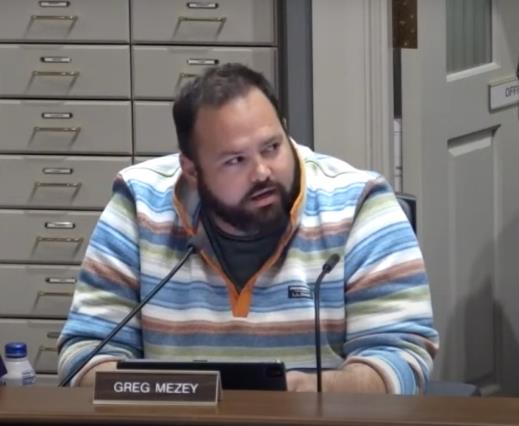
It’s not just County Government that’s tugging at taxpayers’ sleeves, Groton’s Shurtleff reminded everyone.
“I hear it every day in my community about the property taxes,” Shurtleff said. A levy increase of $136 may seem benign to some, he acknowledged. But “if we do $136, and my Town Board does $136, and my Village Board does $136, and God forbid, the School District does $272, twice that, I’ve just taken one of my constituent’s Social Security checks for the next year.”
“If you don’t want to tax your constituents, then you’re probably in the wrong job,” the Town of Ithaca’s Amanda Champion pointedly shot back. Champion was among the eight who opposed the amendment.
So did Lansing’s Deborah Dawson. Dawson argued that tapping fund balance to reduce taxes sends a deceptive message. It hides reckless spending while dissuading taxpayers from getting angry, coming to meetings, and spouting off.
“I don’t think it’s transparent; I don’t think it’s honest; and I don’t think it’s sustainable in the long run,” Dawson said of Mezey’s proposal. “But you all will do what you will do, and I will vote against the budget.”
Dawson didn’t need to vote against the budget that day because Mezey’s amendment failed. Former Legislature Chair Shawna Black called the fund balance tapping ploy “a dangerous shell game.” Enfield-Ulysses’ Anne Koreman insisted it’s “artificially lowering the tax rate.”
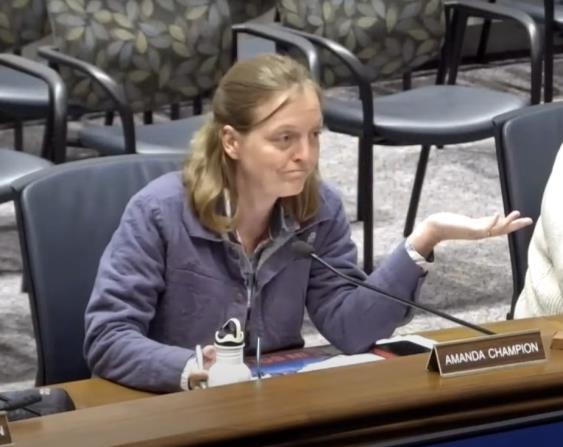
“I think we’ve done a really bad job if we’re going to be doing this at the end,” Koreman said of tapping savings last-minute to tamp down taxes. “It costs a lot to run government.”
Some, like Ithaca’s Rich John, sought compromise. He’d have accepted a three per cent levy increase, but not one as low as Mezey had proposed. “It cuts a little too much,” John said of the Mezey reduction. John’s compromise never got to the floor—not yet.
Compare the Mezey 1.29 per cent tax increase with the two per cent hike adopted one year ago and the zero per cent increases in each of the two prior years.
Budget Committee Chair Mike Lane, like Dawson, a budget hawk, joined the majority chorus for making tax increases a little higher this year.
“You can’t be all things to all people,” Lane lamented near the close of the final day’s discussion. “The fund balance is something we must protect,” he insisted. “You don’t raise employees’ salaries to try to meet inflation without having to raise the revenues and pay for them. Or we don’t pay for everything we buy from pencils to police cars, which are more expensive, without having to raise the revenues to pay them.”
Lane prevailed; Mezey did not. Five-to-eight. Amendment failed. The fund balance would not be touched, at least not in theory.
****
Cut to the chase? We haven’t gotten there yet. Remember that what transpired these first two weeks in October yielded only a recommendation. Legislators will cast their first, binding budget votes come Tuesday, the 15th. They’ll then send the budget to a hearing. And post-hearing, they could still amend it further in November.
History teaches us that Tompkins’ legislators have an uncanny knack for upending their committee’s exhausting labors impulsively, just as though what they’d worked so hard at had never happened. Spending could still tick up, and the tax figure could wobble up or down—likely down toward what was offered, yet not embraced, that final committee day. Tompkins County’s annual budget ritual, messy as it is, has just taken a pause in the drama. It isn’t over yet.
###

